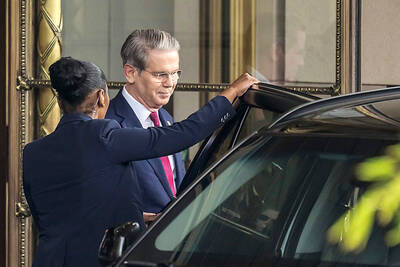Hit by poor sales in the US and Europe, aircraft makers Airbus and Boeing want to ride on the rapid traffic growth in the Asia-Pacific region, where more than 315 aircraft are expected to be delivered over the next five years, officials say.
A dramatic recovery in passenger and cargo traffic in the Asia-Pacific region after the Sept. 11, 2001 attacks in the US may propel the region to become the biggest market for aircraft sales even before the target date of 2020 for achieving that goal, Airbus chief commercial officer John Leahy said.
At present, the Asia-Pacific region is the third largest aircraft sales market after dominant player North America and second-ranking Western Europe.
Aviation experts had forecast that the region, based on its rapid traffic expansion, will overtake North America as the top player in 18 years.
"As this is being playing out, the crisis that we have just seen seems to be accelerating that process, where we see the Asia-Pacific market already recovering from 9/11 and resuming its very strong growth rate," Leahy said on the sidelines of a weekend meeting here of chief executives of 17 leading airlines in the region.
The meeting was held under the ambit of the Association of Asia-Pacific Airlines (AAPA), which said in a report that its members were planning to take delivery of 315 aircraft over the next five years.
The orders and options placed by AAPA members are about 70 percent for the American Boeing aircraft and the remaining for Europe's Airbus.
The two manufacturers are aggressively marketing their products in the region as they strive to overcome the worst downturn in their business.
Leahy said that while Asian airlines had largely restored their levels of profitability after the Sept. 11 crisis, "some airlines in the United States are still losing five, six, seven million dollars a day. "So from a manufacturer's point of view, we see that the spotlight is now moving on to the Asia-Pacific region."
Airbus is negotiating with at least three Asian airlines to sell its new giant A380 plane, Leahy said.
Singapore Airlines will be the first carrier to operate the A380 aircraft, which will have variants to carry passengers and cargo, with deliveries scheduled from the first quarter of 2006.
Airbus Asia spokesman Anthony Phillips said rapid traffic growth would see the Asia-Pacific region being the single largest market globally for aircraft with more than 400 seats such as the flagship 555-seat A380.
In value terms, Airbus estimates the total market value for new aircraft in the region at nearly US$500 billion up to 2020, Phillips said. Boeing opened a new office in Kuala Lumpur recently to enhance operations.

DEFENDING DEMOCRACY: Taiwan shares the same values as those that fought in WWII, and nations must unite to halt the expansion of a new authoritarian bloc, Lai said The government yesterday held a commemoration ceremony for Victory in Europe (V-E) Day, joining the rest of the world for the first time to mark the anniversary of the end of World War II in Europe. Taiwan honoring V-E Day signifies “our growing connections with the international community,” President William Lai (賴清德) said at a reception in Taipei on the 80th anniversary of V-E Day. One of the major lessons of World War II is that “authoritarianism and aggression lead only to slaughter, tragedy and greater inequality,” Lai said. Even more importantly, the war also taught people that “those who cherish peace cannot

Taiwanese Olympic badminton men’s doubles gold medalist Wang Chi-lin (王齊麟) and his new partner, Chiu Hsiang-chieh (邱相榤), clinched the men’s doubles title at the Yonex Taipei Open yesterday, becoming the second Taiwanese team to win a title in the tournament. Ranked 19th in the world, the Taiwanese duo defeated Kang Min-hyuk and Ki Dong-ju of South Korea 21-18, 21-15 in a pulsating 43-minute final to clinch their first doubles title after teaming up last year. Wang, the men’s doubles gold medalist at the 2020 and 2024 Olympics, partnered with Chiu in August last year after the retirement of his teammate Lee Yang

The Philippines yesterday criticized a “high-risk” maneuver by a Chinese vessel near the disputed Scarborough Shoal (Huangyan Island, 黃岩島) in a rare incident involving warships from the two navies. The Scarborough Shoal — a triangular chain of reefs and rocks in the contested South China Sea — has been a flash point between the countries since China seized it from the Philippines in 2012. Taiwan also claims the shoal. Monday’s encounter took place approximately 11.8 nautical miles (22km) southeast” of the Scarborough Shoal, the Philippine military said, during ongoing US-Philippine military exercises that Beijing has criticized as destabilizing. “The Chinese frigate BN 554 was

US Secretary of the Treasury Scott Bessent and US Trade Representative Jamieson Greer began talks with high-ranking Chinese officials in Switzerland yesterday aiming to de-escalate a dispute that threatens to cut off trade between the world’s two biggest economies and damage the global economy. The US delegation has begun meetings in Geneva with a Chinese delegation led by Chinese Vice Premier He Lifeng (何立峰), Xinhua News Agency said. Diplomats from both sides also confirmed that the talks have begun, but spoke anonymously and the exact location of the talks was not made public. Prospects for a major breakthrough appear dim, but there is